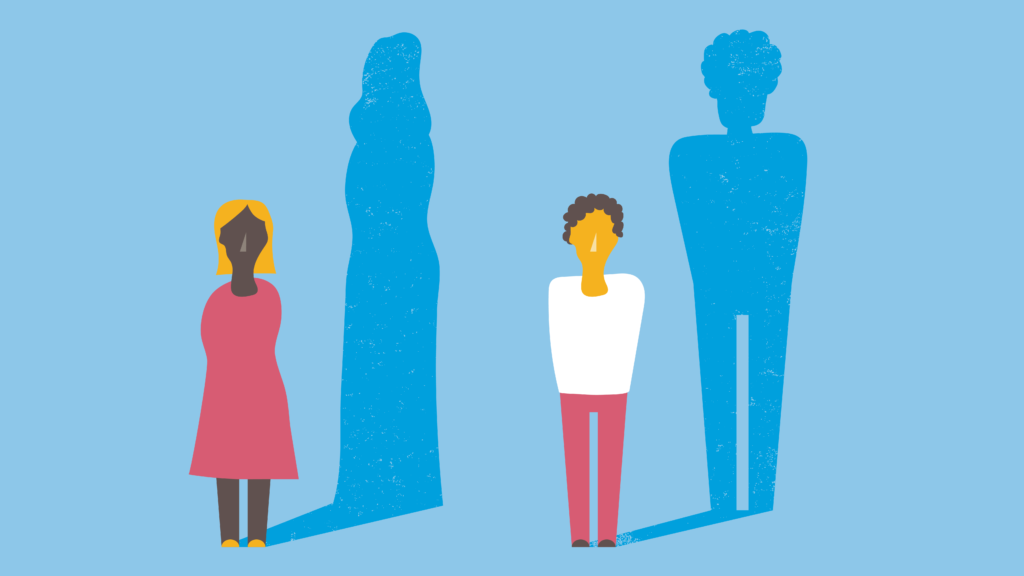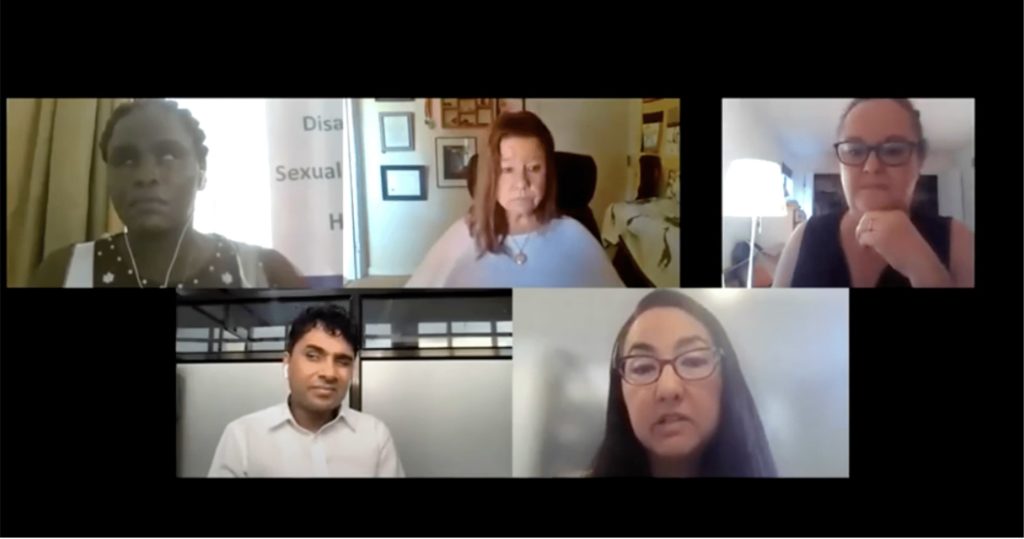Young People With Disabilities: Ensuring Inclusive Access to SRH Services
Recap of Connecting Conversations Theme 4, Session 1

On June 24th, 2021, Knowledge SUCCESS and FP2030 hosted the first session in the fourth theme of the Connecting Conversations series: Celebrating the Diversity of Young People, Finding New Opportunities to Address Challenges, Building New Partnerships. This particular session focused on how the stigmatization of young people with disabilities impacts access to sexual and reproductive health (SRH) services, and what innovative program approaches and considerations are necessary to promote inclusion in SRH information and services.
Missed this session? Read the summary below or access the recordings (in English or French).
Featured speakers:
- Ramchandra Gaihre, General Secretary of the Blind Youth Association Nepal (moderator for the first part of the discussion);
- Cynthia R. Bauer, Founder and Executive Director of Kupenda for the Children;
- Leyla Sharafi, Senior Gender Advisor and Focal Point for Disabilities at UNFPA; and
- Zekia Musa Ahmed, a Humanities & Inclusion consultant.
When we talk about young people with disabilities, what people or scenarios immediately come to mind?
Cynthia Bauer spoke about access to SRH services and stigmatization. Her organization, Kupenda for the Children, supports youth and adolescents living with a wide range of disabilities, such as cerebral palsy and deafness. The organization focuses on transforming harmful beliefs connected to disability to those that improve the lives of children. Due to the stigmatization of people with disabilities in many communities around the world, many of the young people that Kupenda for the Children works with are unfortunately unable to access the information and resources they need. Ms. Bauer stressed that it is important to work to remove superficial beliefs surrounding disabilities that are passed along in some communities.
Zekia Musa Ahmed spoke about the many sociocultural considerations for those with disabilities. She highlighted that various factors—such as age, setting (urban vs. rural), and the type of disability—may influence the way a person experiences their disability and how that person is perceived by others.
Leyla Sharafi offered a global perspective, stating that the young people she has worked with around the world—many of whom are change agents involved in self advocacy and policy efforts in their communities—come to mind. Diversity in terms of region, gender, age, and ability, stand out to her based on the young people she has met over the years.

How can SRH programs be more inclusive of young people with disabilities?
Ms. Ahmed spoke about access to family planning services. Hospitals and other health facilities should be physically accessible to those with disabilities—for example, by building ramps. Additionally, facilities must have Braille translation and sign language interpreters. Finally, coordination with organizations of persons with disabilities (OPDs) and service providers is important, to sort out misconceptions regarding family planning, which are common in many communities.
Ms. Bauer discussed the role of accessible education in promoting inclusion. One of the biggest priorities for Kupenda for the Children is to ensure that children with disabilities are able to access education, as only 10% of children around the world with disabilities are able to do so. Even if a school has inclusive SRH programs, it will not matter if a child is locked at home and unable to access those services. In fact, one of the biggest challenges that Kupenda for the Children has seen in its work in Kenya is getting children to go to school. In Kenya, it is reported that 2-3% of people have a disability, but this is likely not a true estimate since, in comparison, 24% of people in the United States report living with a disability. Worldwide, it is estimated that 15-20% of people are living with a disability; however, that number is simply an estimate. As stated by Ramchandra Gaihre, the data gap is an issue given that many people do not openly discuss disabilities, especially in the context of family planning. Recently, UNFPA has taken the initiative to start collecting this kind of data, a positive step.
Ms. Sharafi spoke about the importance of an enabling legislative environment, quality services, and changing perceptions to promote inclusivity. She helped develop guidelines with Women Enabled International for considerations to take when developing services. Additionally, family planning programs and the monitoring of services need to be robust, and that it is important to consider the mindsets, perceptions, and misconceptions that even health care providers have with regard to young people with disabilities. To address stigma surrounding young people with disabilities accessing SRH services, there are guidelines and information available, such as the AAAQ framework (availability, acceptability, accessibility, and quality). However, investment from government and policy makers is crucial.
What adjustments need to be made, so future programs are more inclusive?
Ms. Sharafi spoke about the importance of adjusting existing services, as services for persons with disabilities don’t need to stand alone. This is discussed in the UN Special Rapporteur on the Rights of Persons with Disabilities. Involving people with disabilities and receiving their inputs is essential for both adjusting and creating new programs that are the most effective. Additionally, commitment from government and policy makers is necessary to sustain these programs.
Ms. Ahmed stressed the importance of improving coordination between OPDs and service providers and having a clear referral system procedure so persons with disabilities can more easily access SRH services. She also spoke about the importance of involving people with disabilities when improving inclusivity in existing programs and creating new programs. It is important to reduce barriers so that people with disabilities can play an active role in such initiatives. Lastly, it is important to collect data on the involvement of individuals with disabilities in these projects.
“Nothing should be done for us without us.” -Zekia Musa Ahmed
Ms. Bauer discussed the humanization of people with disabilities. Teachers in schools, for example, need to have a better understanding of disabilities; there are many types of disabilities and each person living with a disability is unique. There is a common trend around the world of desexualization of people with disabilities. However, people with disabilities are four times as likely to experience sexual abuse. There are structural components in society that create barriers and generate stigma around people living with disabilities. Educating people—faith leaders, school teachers, government representatives—about the humanization of people with disabilities is important to address these barriers.
How do you begin to overcome the stigmas and challenges that people with disabilities face?
Cate Lane, Director of Adolescents and Youth at FP2030, introduced this question by briefly discussing how communities often accept that there are people with disabilities living in their community, but do nothing to mitigate the stigma.
Ms. Bauer spoke about how her organization, Kupenda for the Children, leads one-day workshops with pastors/church leaders, government leaders, parents, and traditional healers. Notedly, 65% of Kupenda for the Children workshop participants reported that they had gone back to their communities, advocated, and discussed ways to mitigate stigma surrounding young people with disabilities. One workshop of 25 people can benefit 324 children with disabilities.
How do we ensure college students living with disabilities are free from gender based/sexual violence and exclusion?
Ms. Sharafi discussed the importance of remembering to include women and girls with disabilities in any work that one is doing, including prevention work on college campuses. There are high rates of gender-based violence for girls, which often goes unreported. Additionally, during the COVID-19 pandemic, there has been an uptick in gender based violence, domestic violence, and sexual violence. Hotlines and services that help women and girls should be inclusive of those with disabilities. Ms. Ahmed added to this point, discussing her work with the Women with Disabilities Network and the need to make sure that the rights of all women and girls are respected, including those living with disabilities.
What strategies have you used to engage people with disabilities? How do you collaborate between OPDs and other civil society organizations?
Ms. Ahmed spoke about actively involving OPDs. She discussed how networking and sharing experiences and ideas is necessary for collaboration between disability organizations and organizations not focused on disabilities.
Ms. Bauer encouraged people to look around the programs they are involved in and ask if people with disabilities are being included—and if not, ask why not. She also discussed how it is difficult to generalize disabilities as they come in many forms. It is thus important to speak to the importance of including those living with disabilities at every table. What one does does not have to be expensive; rather, just starting the conversation about disabilities can be beneficial for both engaging people with disabilities and collaborating between OPDs and other civil society organizations.
Is my meeting accessible? How can everyone get to this place? Can everyone understand what is being said?
Ms. Sharafi closed the conversation by discussing the power of allyship. It is critical that different social justice movements come together, as this can further engage people with disabilities and increase collaboration across organizations. To ensure that people can come together productively, it is important to integrate sign language interpretation in meetings and conferences. Normalizing questions such as, Is my meeting accessible? How can everyone get to this place? Can everyone understand what is being said?, is also important. She also shared guidance developed with UNESCO for out-of-school youth for CSE and several other resources, a checklist for ensuring SRH for people with disabilities during the COVID-19 pandemic, and guidelines for addressing gender-based violence and SRH among young people with disabilities.
About “Connecting Conversations”
“Connecting Conversations” is a series tailored specifically for youth leaders and young people, hosted by FP2030 and Knowledge SUCCESS. Featuring 5 themes, with 4-5 conversations per theme, this series presents a comprehensive look at Adolescent and Youth Reproductive Health (AYRH) topics including Adolescent and Youth Development; Measurement and Evaluation of AYRH Programs; Meaningful Youth Engagement; Advancing Integrated Care for Youth; and the 4 Ps of influential players in AYRH. If you’ve attended any of the sessions, then you know these are not your typical webinars. These interactive conversations feature key speakers and encourage open dialogue. Participants are encouraged to submit questions before and during the conversations.
Our fourth series, Celebrating the Diversity of Young People, Finding New Opportunities to Address Challenges, Building New Partnerships, began on June 24, 2021, and will consist of four sessions. The remaining two sessions will be held on July 22 (Young people living in humanitarian settings: Addressing SRH needs to avoid compounding crisis) and August 5 (Young people from sexual and gender minorities: Expanding Perspectives). We hope you’ll join us!
Want to Get Caught Up on the Previous Conversation Series?
Our first series, which ran from July 15 through September 9, 2020, focused on a foundational understanding of adolescent development and health. Our second series, which ran from November 4 through December 18, 2020, focused on critical influencers to improve young people’s reproductive health. Our third series ran from March 4 to April 29, and focused on an adolescent responsive approach to SRH services. You can watch recordings (available in English and French) and read conversation summaries to catch up.




